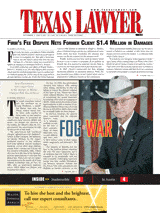
National Recognition
Our personal injury attorneys have helped our clients take dangerous products off the market, hold insurance companies accountable, and strengthen workplace safety practices.
Our dedication to making a difference in our clients’ lives has brought us into the national spotlight several times.
Here are some of the media sources that have featured the 2025 Texas Super Lawyers of Roberts & Roberts in recent years:
Television Appearances

MSNBC consults Randell (Randy) C. Roberts about the civil implications of a possible criminal probe into corporate misconduct.

FOX & Friends interviews Randell (Randy) C. Roberts and one of his clients.

Fox Business consults Randell (Randy) C. Roberts about class actions.

CNN consults Randell (Randy) C. Roberts about “black box” technology in reconstructing motor vehicle accidents.

ABC features one of Randell (Randy) C. Roberts’ cases on Good Morning America.

Geraldo Rivera interviews Randell (Randy) C. Roberts and one of his clients.

CNBC consults Randell (Randy) C. Roberts about the legal strategy for connecting the dots to see the big picture in a products liability case.

Chris Hayes discusses his interview with Randell (Randy) C. Roberts about the West fertilizer plant explosion on “All In With Chris Hayes.”

CNN’s coverage of the Congressional hearings into the Firestone tire recall credited Randy Roberts for helping bring about this recall.

NBC’s Dateline featured one of Randell (Randy) C. Roberts’ ground-breaking cases.
View Dateline TV Coverage Transcript »
Magazines & Publications
Click below to read about Roberts & Roberts and its cases in national and international publications.
 Newsweek |
 Time Annual |
|
|
 Newsweek |
 Weekend with The Stars Conference |
||
 Texas Super Lawyers
|
 Texas Lawyer
|
 Texas Monthly |
Newspaper Coverage
 New York Daily News |
 Los Angeles Times |
||
 Fort Worth Star-Telegram Fort Worth Star-Telegram |
|||
Associated Press Coverage:
- The Boston Globe
- The Oakland Press
- The Salt Lake Tribune
- The San Diego Union-Tribune
- The (Washington, DC) Examiner
- And more…
Free & Confidential Consultation
"I am so happy to have chosen the best law firm around. The staff is amazing in handling your questions promptly. I hope I don't ever need them again, but if I do, there is no question I will be back. Thank y'all so much for helping me." - Heather N.

FOX & Friends interviews Randell (Randy) C. Roberts and one of his clients.

Fox Business consults Randell (Randy) C. Roberts about class actions.

CNN consults Randell (Randy) C. Roberts about “black box” technology in reconstructing motor vehicle accidents.

ABC features one of Randell (Randy) C. Roberts’ cases on Good Morning America.

Geraldo Rivera interviews Randell (Randy) C. Roberts and one of his clients.

CNBC consults Randell (Randy) C. Roberts about the legal strategy for connecting the dots to see the big picture in a products liability case.

Chris Hayes discusses his interview with Randell (Randy) C. Roberts about the West fertilizer plant explosion on “All In With Chris Hayes.”

CNN’s coverage of the Congressional hearings into the Firestone tire recall credited Randy Roberts for helping bring about this recall.

NBC’s Dateline featured one of Randell (Randy) C. Roberts’ ground-breaking cases.
View Dateline TV Coverage Transcript »
Magazines & Publications
Click below to read about Roberts & Roberts and its cases in national and international publications.
 Newsweek |
 Time Annual |
|
|
 Newsweek |
 Weekend with The Stars Conference |
||
 Texas Super Lawyers
|
 Texas Lawyer
|
 Texas Monthly |
Newspaper Coverage
 New York Daily News |
 Los Angeles Times |
||
 Fort Worth Star-Telegram Fort Worth Star-Telegram |
|||
Associated Press Coverage:
- The Boston Globe
- The Oakland Press
- The Salt Lake Tribune
- The San Diego Union-Tribune
- The (Washington, DC) Examiner
- And more…








